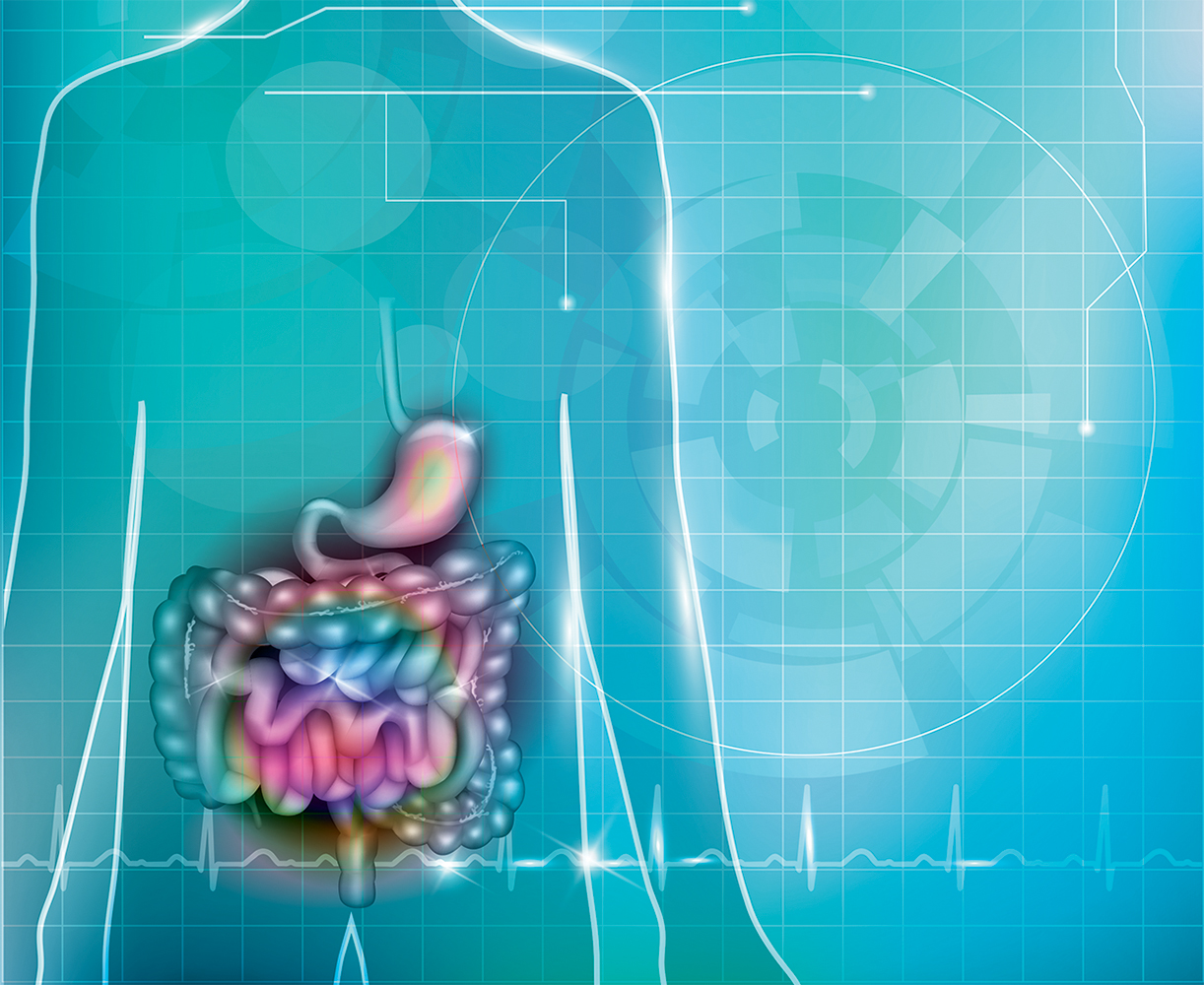Most people—perhaps embarrassed—simply suffer in silence, but there’s no reason to
By Wendy Haaf
Though they rarely herald imminent danger to life or health, digestive problems such as gas, bloating, and constipation can cause a great deal of discomfort—and they’re extremely common. For instance, in one 2001 survey-based Canadian study of 1,149 adults, nearly a third said they had experienced constipation in the previous three months, with 16.7 per cent meeting specific criteria used to formally diagnose the condition.
And yet, perhaps due to embarrassment, even when such problems linger, few people—just 34 per cent, according to one study—consult a health professional; instead, many turn to over-the-counter remedies, often for extended periods. However, it’s definitely worth consulting your care provider, in part to rule out possible underlying and treatable culprits such as lactose intolerance, irritable bowel syndrome (IBS), and celiac disease. In fact, since such symptoms can sometimes—though uncommonly—herald colorectal cancer, and since risk for the disease rises with age, anyone over 55 who “has a new onset of those symptoms should see the doctor,” says Dr. Yasmin Nasser, a clinical assistant professor in the Calgary Division of Gastroenterology and Hepatology at the University of Calgary. (You should seek medical attention urgently if a change in bowel habits is accompanied by blood in the stools, black stools, unintentional weight loss, narrowing of the stools, or a family history of inflammatory bowel disease.)
So what might be behind the problem and what might you do about it?
Gas and Bloating
“Gas and bloating are two of the most common complaints that we see patients for,” says Andrea Hardy, a registered dietitian and the owner of Ignite Nutrition Inc., in Calgary. While a lot of people worry that passing gas isn’t normal, in fact, “the average person passes gas about 13 to 21 times a day,” Hardy says. In fact, since the beneficial bacteria in our gut require a steady diet of fibre (which we can’t digest) to thrive, and gas is a by-product of this process, arguably wind is a sign “that you’re getting the nutrition you need,” Hardy says. Consequently, while passing gas may be frowned upon socially, it isn’t in itself cause for concern.
However, if it’s causing pain and discomfort, “that’s when we can consider making dietary changes to reduce some of that,” Hardy says. And contrary to what you might think, that doesn’t necessarily start with avoiding healthy foods with a reputation for making people gassy, such as beans, legumes, and cruciferous vegetables.
If you’ve adopted a low-carb or keto diet, for instance, that could be playing a role. “High intake of fats, as well as a lot of animal products can contribute to gas and bloating,” Hardy says. “High fat intake slows digestion, so it gives more time for gut bacteria to produce gas, and it actually reduces gas clearance, so the gas gets trapped in your belly longer, which can lead to a lot of pain and discomfort,” she explains. So rather than cutting out certain types of foods entirely, “we want to focus on a bit more balance: getting in protein, carbohydrates, and fats, and not being restrictive about any particular category,” Hardy says.
Other common dining habits that can help set the stage for uncomfortable bloating include skipping meals and skimping on breakfast and lunch. “By the time supper rolls around, you’re starving,” Hardy says. “You end up eating quite a lot of food at once, which can slow down digestion in comparison to frequent meals. Regular eating can contribute to reducing some of the gas pains people might experience.”
A condition that results from the lack of an enzyme responsible for breaking down milk sugars—known as lactose intolerance—can allow these substances to ferment, resulting in excess gas and bloating. However, in studies, many people who report dairy intolerance don’t test positive for the condition. Before eliminating dairy (or any other food group) from your diet, it’s a good idea to consult a registered dietitian, who can advise you on how to find the nutrients those foods contain in other sources.
A long-standing history of recurring abdominal pain accompanied by bouts of diarrhea, constipation, or both can suggest the presence of IBS, which affects nearly one in five Canadians, typically beginning before age 40. “Patients have pain that often gets better with having a bowel movement,” says Nasser, although, she adds, “sometimes the pain worsens after a bowel movement.” Think of IBS as oversensitivity of the nerves connecting the bowel to the brain, which translates normal stretching of the bowel into pain.
Consequently, certain types of natural sugars (known as FODMAPs) that either ferment in the bowels or pull more water into them can play a role in causing symptoms. Adopting a special diet under the supervision of a dietitian can help “identify which foods, and what amounts of those foods, cause symptoms,” Hardy explains. The point isn’t to cut them out, but to calibrate the amounts necessary to manage digestive issues. And sticking to a low-FODMAP diet long term is definitely not recommended. “It should be tried for six weeks at most,” Nasser stresses. Why? Since FODMAPs are fuel for our beneficial gut flora, a scant supply can shrink the populations of these “good” bacteria, Hardy explains, “which isn’t conducive to good long-term health.”
Stress, anxiety, and depression can worsen IBS symptoms because these things “change how your brain perceives pain from your gut,” Nasser explains. Deep breathing and meditation, however, can dampen that perception; a gastroenterologist-written website called thebreathproject.org can help people with IBS learn to use these tools, Nasser says.
Other treatments for IBS include various prescription medications. For more information on IBS, visit cdhf.ca and badgut.org.
Finally, abdominal pain sometimes stems from small “pockets” in the bowel. “With a Western diet, we all have these little ‘out-pouchings’ by the age of 40,” Nasser says. Called “diverticula,” these pockets “can cause problems in two different ways,” she says: by bleeding or by becoming infected and inflamed (a condition known as “diverticulitis”). “If people are having a lot of pain in their tummy and have fever, that’s a reason to see a doctor,” Nasser advises.
Constipation
We all think we know what constipation means, but how is it defined? One common definition is slow passage of waste through the bowels, compared to the normal range of one bowel movement every three days to three a day. Other definitions include having hard stools more than 25 per cent of the time, and still feeling as if you have to go after having a bowel movement.
If you’re experiencing such problems, reviewing any medications you’re taking with your doctor or pharmacist is a good place to start. “A lot of prescription and even over-the-counter medications are quite constipating,” explains Dr. Jessica Otte, a Nanaimo, BC, family physician specializing in geriatrics and palliative care. Potential culprits include calcium supplements, multivitamins containing minerals, non-steroidal anti-inflammatory drugs (such as ibuprofen), some blood-pressure drugs, certain medications used to treat Parkinson’s disease, and opioids. If any of these are likely suspects, switching to a different drug class, changing the dose, or even phasing out a medication that may no longer be needed are possible solutions.
Irregular eating patterns and inadequate fluid and fibre in the diet may exacerbate the natural slowing of rhythmic bowel muscle contractions that happens as we get older. “Regular eating stimulates movement of the gut, which can help with constipation and passing gas,” Hardy says. The same is true of walking and other types of exercise. Foods containing fibre (such as vegetables, fruit, whole grains, and nuts and legumes) increase stool bulk and draw in water, making stools softer and easier to pass. Fibre also acts as a “street sweeper,” moving waste along and helping reduce the risk of developing diverticulitis, Hardy adds.
“It’s surprising how much fibre we need for digestive health,” Nasser says. Canadians take in, on average, only half the recommended daily amounts, which, for those over age 50, is 21 grams for women and 30 for men.
However, increasing your fibre intake too abruptly or without drinking enough fluids can actually stop you up and cause gas and bloating, so starting slowly is the key to long-term success. One strategy that Hardy suggests is gradually adjusting your diet by adding one new habit until it’s well-established, and then adding another: for instance, adding fruit to your breakfast, eating one serving of nuts or other plant protein each day, and covering half your plate with vegetables.
And if you like fruit, two specific kinds may also be helpful—prunes and other pitted fruits are not only high in fibre, but “they contain sorbitol, a carbohydrate that’s really good at pulling water into the bowel,” Hardy says. “Five to six dried prunes a day is an easy way to up your fibre intake and help resolve constipation.” Moreover, “Kiwis contain an enzyme that has been shown to help stimulate regular bowel movements,” Hardy explains, adding that two of the fuzzy fruits a day may help improve the frequency of bowel movements.
If dietary changes are off the table or aren’t sufficient, a fibre supplement is a reasonable option for some. Of the two types of fibre—insoluble (think wheat bran) and soluble—Nasser says she finds increasing the latter, in the form of psyllium husks or Metamucil, is less likely to cause excess gas and bloating. “I tell my patients to put a teaspoon in a glass of water, then have a second glass of water—you always have a second glass of water because too much fibre without water bungs you up. Then you very slowly increase from there.”
People who must restrict fluids (those with heart failure, for example) or are still having problems despite trying other measures should consider an over-the-counter laxative. Dr. Otte, who has reviewed the evidence behind different types, recommends skipping one particular product. “It’s pretty clear from the medical literature that docusate is ineffective,” she says.
Most of the scant research that’s been done to date on laxatives, she adds, only compares different types of the same class to each other, most commonly using the following yardstick for success: “whether a patient achieved three spontaneous bowel movements per week or at least one additional bowel movement per week than when they weren’t on the drugs,” Otte says. Of the so-called “osmotic agents”—medications that bring additional water into the bowel—which include Milk of Magnesia and lactulose, “polyethylene glycol is one of the best tolerated and most effective by those standards,” Otte says. The same medication that’s prescribed prior to a colonoscopy, but in a much smaller dose, polyethylene glycol “is very safe to use once in a while; we give it to pregnant women and babies,” Nasser says.
If, however, you try one of these over-the-counter treatments without success or if constipation continues to recur, don’t resign yourself to ongoing abdominal pain and having to plan your life around your bowels—see your doctor. Chronic constipation “can be easy to treat,” Otte says. And “it can really improve someone’s life to get it sorted out.”
Photo: iStock/TefiM.





